X-Ray Diffraction Laboratory
The X-Ray Diffraction Laboratory provides access to a wide range of X-ray diffraction analysis services such as powder sample analysis and full crystal structure determination. These services are available to University research teams, academic institutions, laboratories and private companies.
LABORATORY SERVICES
You will find below a non-exhaustive list of services provides by the Laboratory.
General diffraction
- Analysis and identification of polycrystalline samples by X-ray diffraction
- X-ray diffraction of films or fiber in reflection or transmission mode
- Variable temperatures X-ray diffraction for studying transformation, phase transitions or desolvatation processes
- Microdiffraction, 2-dimensional X-ray diffraction, mapping and surface measurements
Single crystal analysis
- Sorting and selection of single crystals
- Diffraction test
- Crystal mounting, including air, temperature or moisture-sensitive samples
- Unit-cell lattice parameters, symmetry or space group determination
- Face indexing of single crystals
- Complete crystal structure determination for organic or inorganic molecules at room temperature or low temperature
- Crystal structure analysis with geometry data (bond lengths, bond angles, conformation) and report with high-quality molecular plots
Procedure
To submit a sample, download the submission form or fill the on-line submission form. You can also send an e-mail to arrange a meeting or to check the pricing.
Note that a submission is fully considered once the quality of the samples has been checked by an optical examination with a polarized light microscope to see if they are appropriate for a single crystal X-ray diffraction study.
For sending samples via mail or delivery services, use the following address:
Laboratoire de diffraction des rayons X - a/s de Thierry Maris
Université de Montréal
Pavillon des Sciences, Campus MIL
Local B-1118.1
1375 Avenue Thérèse Lavoie-Roux
Montréal, Qc. H2V 0B3
INSTRUMENTS
The laboratory is able to perform a broad range of applications including the data collection on single crystal for structural determination, general X-ray powder diffraction for sample identification or substances quantification by the Rietveld method, variable temperature studies, polymer/fiber diffraction, and even more specialized techniques such as PDF measurement or in-situ/in-operando battery X-ray diffraction experiments.
Single crystal X-ray diffractometers
Bruker Venture Metaljet
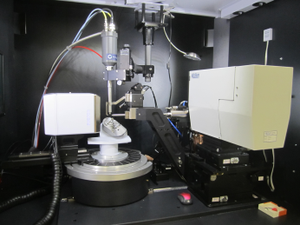
With its liquid metal jet source, this instrument provides very high brightness and allows measurement on very small crystals in very fast times. We can thus obtain a first visualization of the complete 3D structure of a molecule in less than ten minutes from data collected on a crystal whose average dimension is less than 0.1 mm. As the first instrument of this type to be installed in Canada, the Metaljet offers the possibility of analysing between 2 to 6 crystals per day. The wavelength of the Gallium-based alloy used for the liquid jet anode (1.34 Å) is between the wavelengths of the conventional X-rays source: copper (1.54 Å) and molybdenum (0.71 Å). This makes possible to analyze both organic molecules and organometallic complexes with various sizes and complexities.
Bruker APEX IMuS
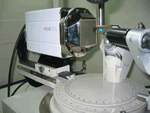
This instrument is mounted on a 3-circle platform and use an APEX II CCD camera. It is suitable for routine single-crystal diffraction studies using a conventional sealed-tube X-ray source generated with a copper anode. The diffractometers includes a cooling device enabling low temperatures experiments. The new-generation CCD detector allows a fast exposure time. This instrument is typically used for organic and organo-metallic compounds with crystals of reasonable/standard size.
General and X-ray powder diffraction
Empyrean DY-2516
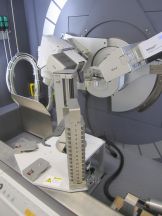
This diffractometer is configured with Bragg-Brentano geometry and can measure in reflection or transmission. It has a sample changer with 15 positions. Its PIXcel3D detector incorporates an energy discriminator capable of eliminating the fluorescence observed with certain elements (Fe, Mn, Co) when measuring with copper radiation. It is used for routine measurements; the possible sources are copper and cobalt. Measurement of air-sensitive samples is possible using special sample holders (dome or mylar films).
Empyrean DY-2519
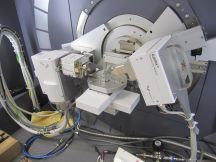
This instrument is similar to the DY-2516 diffractometer with more options and versatility for the sample holders. Several sources can be used including the standard copper and cobalt sources, but also more penetrating sources (Mo, Ag) suitable for in operando and in situ battery studies and pair distribution function measurements (PDF). A controlled environment chamber can be installed for studies at variable temperature (up to 600 ° C) or for monitoring chemical reactions in a controlled atmosphere.
D8 Advance
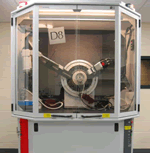
This instrument measures X-ray diffraction patterns on polycrystalline samples. It is used for routine measurements when a good quantity of samples is available. It includes an automatic sample changer and has a primary Ge monochromator to deliver pure k-alpha1 copper radiation.
RATES
All prices are in Canadian dollars (CAD).
Single-Crystal Diffraction
Service | Université de Montréal & External Universities | Industry |
Structural studies performed by the Service |
|
|
Complete Structure determination (CIF file) a | 230 $ | 900 $ |
Data Collection Only (hkl file) | 150 $ | 500 $ |
Standalone use of the instruments |
| |
User Training (Mandatory) | 600 $ | n.a. |
Data Collection b | 80 $ | n.a. |
Standalone Fast Data Collection (Unit-cell, structure check) | 30 $ | n.a. |
a No fees will be charged if the structure cannot be determined. A reduced fee of $70 will be charged in the event of an unwanted structure when the client does not request the finalized CIF file. b A quick collection is an experiment of less than one hour, which (usually) enables to get the structure, but does not provide sufficient data for a publication. | ||
General / X-ray Powder Diffraction
Service | Université de Montréal & External Universities | Industry |
Pattern measurement | 20 $ / h | n. d. |
Routine experiment a | 50 $ | 200 $ |
Non-routine experiment b | 75-150 $ | 300-600 $ |
a X-Ray diffraction pattern measurement, PDF Database Search, Phase Identification, Basic Report b For example: Pattern indexing and unit-cell search, variable temperature measurements, kinetic studies, Rietveld refinement. Contact the service to finalise details | ||
TUTORIALS
- "Symmetry and space group tutorial" by Jerry P. Jasinski and Bruce M. Foxman
- JAVA applet on Bragg's law and diffraction by Konstantin Lukin
- Crystalline Insights: X-ray diffraction and crystal structure determination, by Michael J. Vela, Tae H. Cho and Bruce M. Foxman
- Disordered structure refinement with SHELXL by Peter Müller and twinning tutorial by Regine Herbst-Irmer